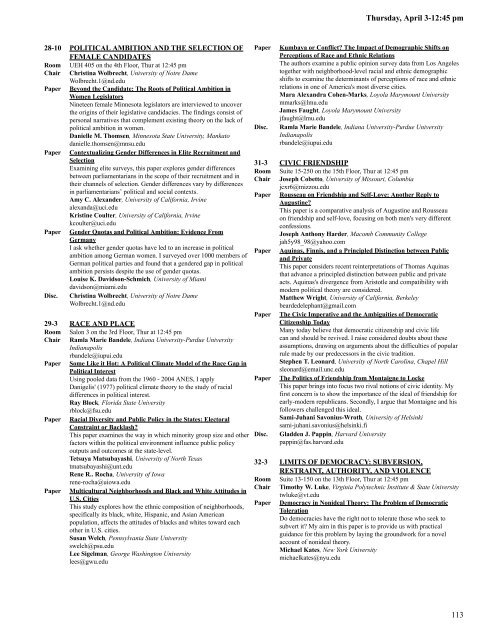2008 Conference Program - Midwest Political Science Association
2008 Conference Program - Midwest Political Science Association
2008 Conference Program - Midwest Political Science Association
You also want an ePaper? Increase the reach of your titles
YUMPU automatically turns print PDFs into web optimized ePapers that Google loves.
Thursday, April 3-12:45 pm<br />
28-10 POLITICAL AMBITION AND THE SELECTION OF<br />
FEMALE CANDIDATES<br />
Room UEH 405 on the 4th Floor, Thur at 12:45 pm<br />
Chair Christina Wolbrecht, University of Notre Dame<br />
Wolbrecht.1@nd.edu<br />
Paper Beyond the Candidate: The Roots of <strong>Political</strong> Ambition in<br />
Women Legislators<br />
Nineteen female Minnesota legislators are interviewed to uncover<br />
the origins of their legislative candidacies. The findings consist of<br />
personal narratives that complement existing theory on the lack of<br />
political ambition in women.<br />
Danielle M. Thomsen, Minnesota State University, Mankato<br />
danielle.thomsen@mnsu.edu<br />
Paper Contextualizing Gender Differences in Elite Recruitment and<br />
Selection<br />
Examining elite surveys, this paper explores gender differences<br />
between parliamentarians in the scope of their recruitment and in<br />
their channels of selection. Gender differences vary by differences<br />
in parliamentarians’ political and social contexts.<br />
Amy C. Alexander, University of California, Irvine<br />
alexanda@uci.edu<br />
Kristine Coulter, University of California, Irvine<br />
kcoulter@uci.edu<br />
Paper Gender Quotas and <strong>Political</strong> Ambition: Evidence From<br />
Germany<br />
I ask whether gender quotas have led to an increase in political<br />
ambition among German women. I surveyed over 1000 members of<br />
German political parties and found that a gendered gap in political<br />
ambition persists despite the use of gender quotas.<br />
Louise K. Davidson-Schmich, University of Miami<br />
davidson@miami.edu<br />
Disc. Christina Wolbrecht, University of Notre Dame<br />
Wolbrecht.1@nd.edu<br />
29-3 RACE AND PLACE<br />
Room Salon 3 on the 3rd Floor, Thur at 12:45 pm<br />
Chair Ramla Marie Bandele, Indiana University-Purdue University<br />
Indianapolis<br />
rbandele@iupui.edu<br />
Paper Some Like it Hot: A <strong>Political</strong> Climate Model of the Race Gap in<br />
<strong>Political</strong> Interest<br />
Using pooled data from the 1960 - 2004 ANES, I apply<br />
Danigelis' (1977) political climate theory to the study of racial<br />
differences in political interest.<br />
Ray Block, Florida State University<br />
rblock@fsu.edu<br />
Paper Racial Diversity and Public Policy in the States: Electoral<br />
Constraint or Backlash<br />
This paper examines the way in which minority group size and other<br />
factors within the political environment influence public policy<br />
outputs and outcomes at the state-level.<br />
Tetsuya Matsubayashi, University of North Texas<br />
tmatsubayashi@unt.edu<br />
Rene R.. Rocha, University of Iowa<br />
rene-rocha@uiowa.edu<br />
Paper Multicultural Neighborhoods and Black and White Attitudes in<br />
U.S. Cities<br />
This study explores how the ethnic composition of neighborhoods,<br />
specifically its black, white, Hispanic, and Asian American<br />
population, affects the attitudes of blacks and whites toward each<br />
other in U.S. cities.<br />
Susan Welch, Pennsylvania State University<br />
swelch@psu.edu<br />
Lee Sigelman, George Washington University<br />
lees@gwu.edu<br />
Paper<br />
Disc.<br />
Kumbaya or Conflict The Impact of Demographic Shifts on<br />
Perceptions of Race and Ethnic Relations<br />
The authors examine a public opinion survey data from Los Angeles<br />
together with neighborhood-level racial and ethnic demographic<br />
shifts to examine the determinants of perceptions of race and ethnic<br />
relations in one of America's most diverse cities.<br />
Mara Alexandra Cohen-Marks, Loyola Marymount University<br />
mmarks@lmu.edu<br />
James Faught, Loyola Marymount University<br />
jfaught@lmu.edu<br />
Ramla Marie Bandele, Indiana University-Purdue University<br />
Indianapolis<br />
rbandele@iupui.edu<br />
31-3 CIVIC FRIENDSHIP<br />
Room Suite 15-250 on the 15th Floor, Thur at 12:45 pm<br />
Chair Joseph Cobetto, University of Missouri, Columbia<br />
jcxr6@mizzou.edu<br />
Paper Rousseau on Friendship and Self-Love: Another Reply to<br />
Augustine<br />
This paper is a comparative analysis of Augustine and Rousseau<br />
on friendship and self-love, focusing on both men's very different<br />
confessions.<br />
Joseph Anthony Harder, Macomb Community College<br />
jah5y98_98@yahoo.com<br />
Paper Aquinas, Finnis, and a Principled Distinction between Public<br />
and Private<br />
This paper considers recent reinterpretations of Thomas Aquinas<br />
that advance a principled distinction between public and private<br />
acts. Aquinas's divergence from Aristotle and compatibility with<br />
modern political theory are considered.<br />
Matthew Wright, University of California, Berkeley<br />
beardedelephant@gmail.com<br />
Paper The Civic Imperative and the Ambiguities of Democratic<br />
Citizenship Today<br />
Many today believe that democratic citizenship and civic life<br />
can and should be revived. I raise considered doubts about these<br />
assumptions, drawing on arguments about the difficulties of popular<br />
rule made by our predecessors in the civic tradition.<br />
Stephen T. Leonard, University of North Carolina, Chapel Hill<br />
sleonard@email.unc.edu<br />
Paper<br />
Disc.<br />
The Politics of Friendship from Montaigne to Locke<br />
This paper brings into focus two rival notions of civic identity. My<br />
first concern is to show the importance of the ideal of friendship for<br />
early-modern republicans. Secondly, I argue that Montaigne and his<br />
followers challenged this ideal.<br />
Sami-Juhani Savonius-Wroth, University of Helsinki<br />
sami-juhani.savonius@helsinki.fi<br />
Gladden J. Pappin, Harvard University<br />
pappin@fas.harvard.edu<br />
32-3 LIMITS OF DEMOCRACY: SUBVERSION,<br />
RESTRAINT, AUTHORITY, AND VIOLENCE<br />
Room Suite 13-150 on the 13th Floor, Thur at 12:45 pm<br />
Chair Timothy W. Luke, Virginia Polytechnic Institute & State University<br />
twluke@vt.edu<br />
Paper Democracy in Nonideal Theory: The Problem of Democratic<br />
Toleration<br />
Do democracies have the right not to tolerate those who seek to<br />
subvert it My aim in this paper is to provide us with practical<br />
guidance for this problem by laying the groundwork for a novel<br />
account of nonideal theory.<br />
Michael Kates, New York University<br />
michaelkates@nyu.edu<br />
113










